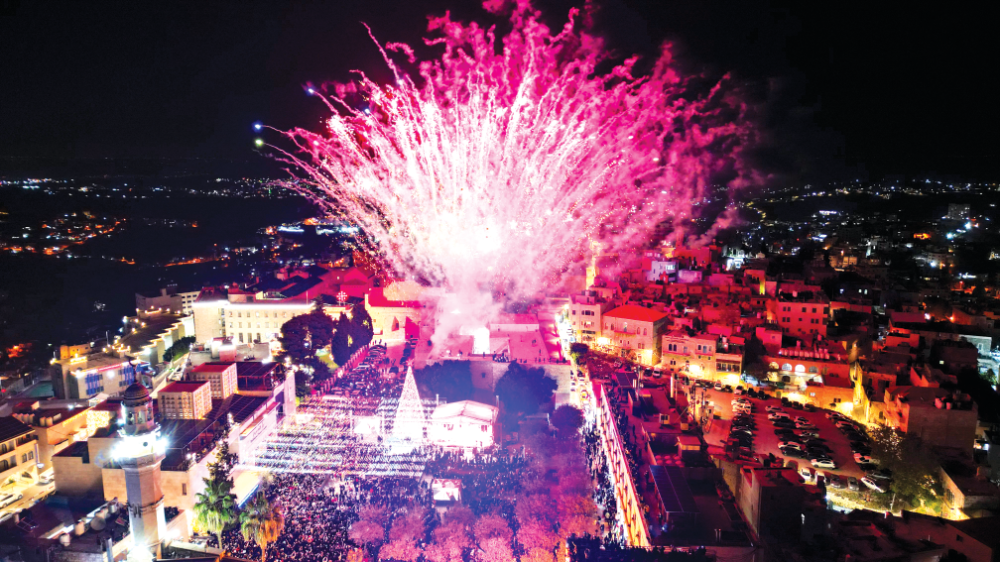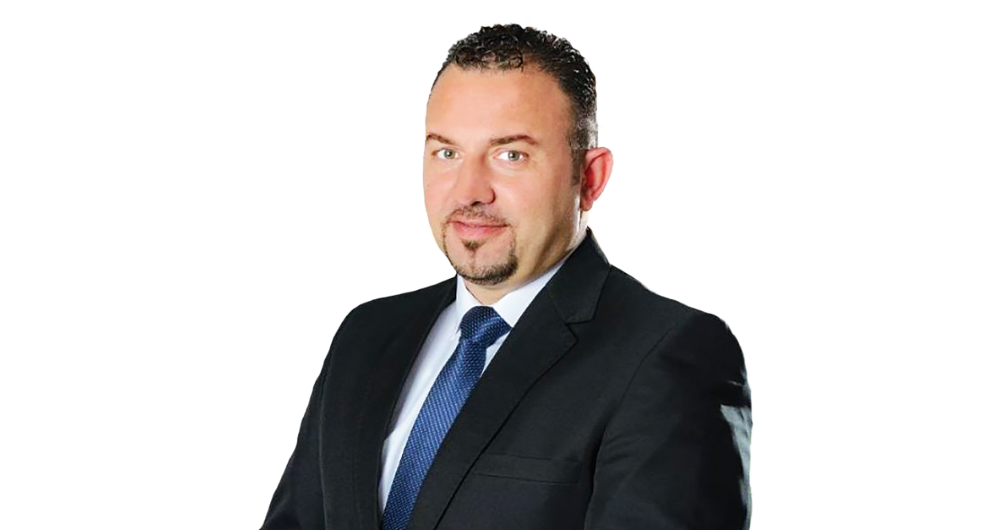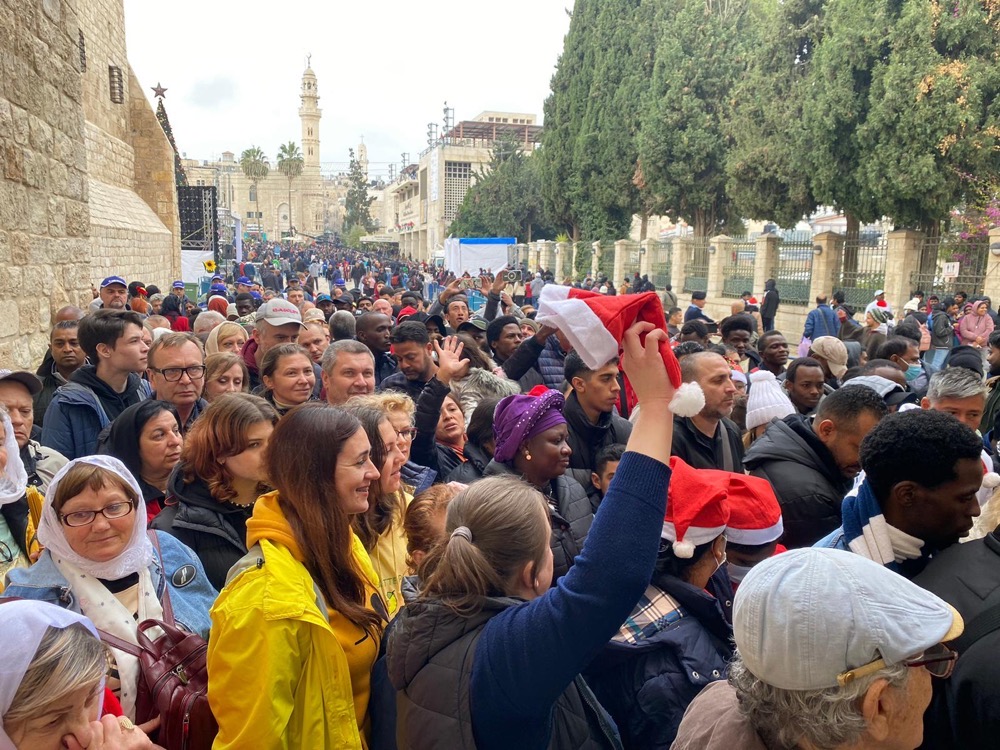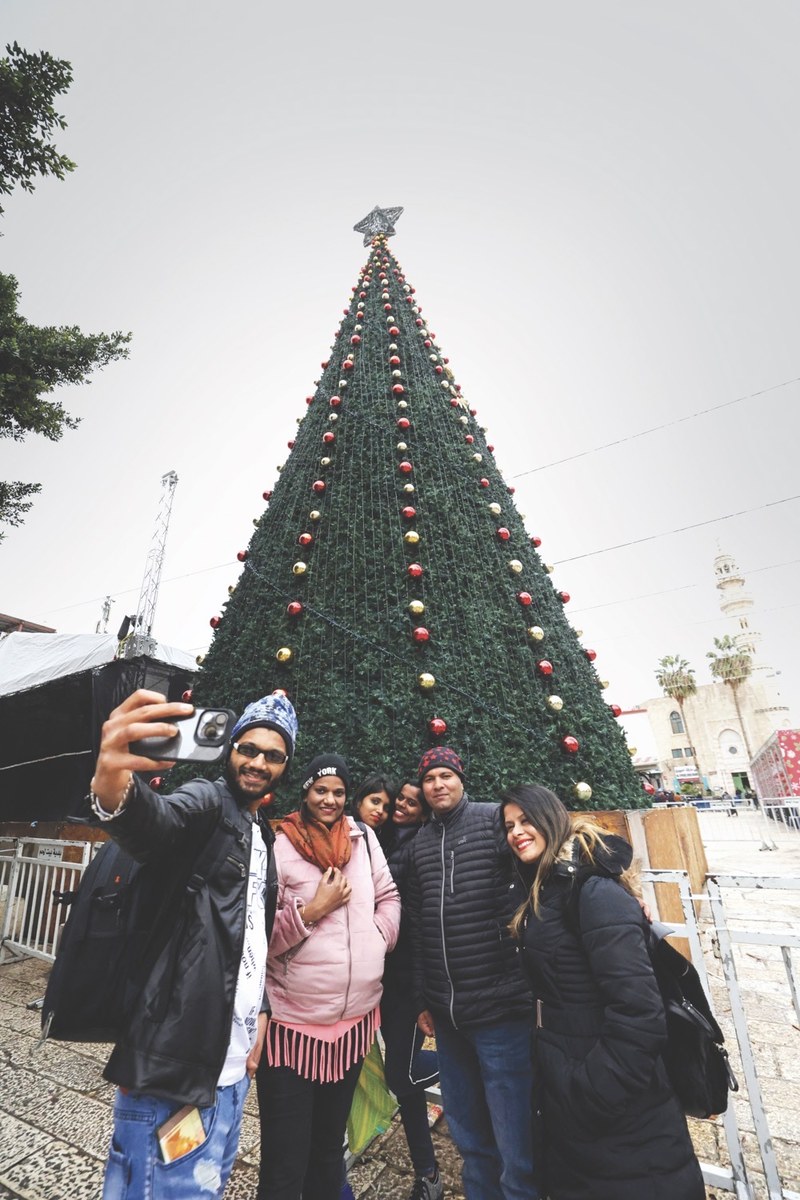https://arab.news/n5zp8
BETHLEHEM: Bethlehem, the birthplace of Jesus Christ, is an unusual place: An Arab city, with a respected Christian Palestinian mayor, yet living under Israeli occupation. Like other urban areas in the occupied West Bank, the city is surrounded by illegal settlements and constricted by a high wall, constantly under the watch of Israeli soldiers.
Palestinians are especially fearful this Christmas, with Benjamin Netanyahu set to return as Israeli prime minister at the helm of the most hardline Cabinet in the country’s history.
But the settlements, the wall, the occupation and the inevitability of a new radical-right government in Israel are not stopping Bethlehem’s mayor, Hanna Hanania, from focusing on the positive, at least during the Christmas holidays.
In an interview with Arab News, he described the city as a source of light for the world and a place that brings people together.

“When I turned on the lights of the Christmas tree in Bethlehem’s Manger Square on Dec. 3, I said the light of the tree will radiate to the world our desire for peace,” he said. “We chose the theme of the holidays that Christmas brings people together.”
Hanania, who was elected in March, will be officiating the city’s three annual Christmas events. Catholics and Protestants celebrate Christmas Eve on Dec. 24, Orthodox and other eastern churches on Jan. 6, while Armenians wait until Jan. 18.
The city’s crown jewels are the 1,700-year-old Church of the Nativity and the historic Star Street, both of which have been recognized by UNESCO as protected World Heritage sites.
Sophia Vantunu, a 35-year-old tourist from the US state of New Jersey, considers it a privilege to be celebrating Christmas in the holy city of Bethlehem.
“Especially for me, this was unique in many ways, including the lighting of the tree and the festivities that took place in and around Bethlehem,” she told Arab News.
George Menah, a Bethlehem tour guide, says the Church of the Nativity — built on what is believed to be the site of Christ’s birth — and the city’s many other heritage and religious sites are extremely popular with tourists and pilgrims.
“The Church of the Nativity is one of the oldest churches in the world and the city,” he told Arab News. “Throughout history, several holy treasures have been found there. Now, new discoveries are continuously being made, and the church is still being gradually explored for these artifacts.”
This year marks the 150th anniversary of the establishment of Bethlehem as a municipality. Over the past century and a half, its population has swelled — as have the number of hotels, which were not available to Mary and Joseph that night, now more than 2,000 years ago.

However, Hanania says the growth of the city’s population and its infrastructure has been restricted by the occupation.
“Israel built an eight-meter-high concrete wall deep inside our land, and they refused to allow us to enjoy our normal growth in terms of our city plans due to the imposition of illegal Jewish settlements in the Bethlehem area,” he told Arab News.
For the people of Bethlehem, the pain of the occupation is palpable in more ways than just stymied economic growth. At the beginning of this month, Israeli forces killed one and injured six Palestinians in a refugee camp south of the city after clashes broke out following Israeli raids on the camp.
The uncertain political situation notwithstanding, Palestinians in Bethlehem have embraced the influx of tourists. Bob Felton, a 50-year-old tourist from Greece, says he is thrilled to visit the holy city following the lifting of pandemic travel restrictions.
“After being stuck home for over two years due to the coronavirus, we were very excited to visit Bethlehem, a holy city that represents Christmas and Christ,” Felton told Arab News. “We pray that the years to come will be nice and that we will feel the spirit of Christmas in this holy city.”
Nina Azar, a Palestinian tour guide, avers that the city’s emergence from the pandemic has resulted in a flood of visitors. “Tourism has returned this year, gradually and more vigorously than in previous years, with visitors coming from various nations to feast in the holy city,” she told Arab News.
Echoing Azar’s optimism, Hanania says the tourism industry and visitor numbers are now back to pre-pandemic levels. “The city’s hotels, shops, and restaurants are again bustling with visitors who want to see and touch the birthplace of Jesus. In November this year alone, 123,000 visited Bethlehem,” he told Arab News.
Joseph Giacaman, a souvenir-shop owner in Manger Square, concurs that tourism has picked up this year.

“We have increased in numbers compared to last year, and the economic state has become better in the city, so we are making more money this year because demand has increased, and supply is limited due to the fact that there are a lot more products that are being shipped abroad,” he told Arab News.
“We are able to get better prices because demand has increased, and supply has been limited because many workplaces are shipping their products abroad in much larger amounts than usual.”
Bethlehem is famous for its olivewood handcrafts. Mohanad Ramadan, a wood worker, says his business has seen an increase in exports. “Last year, I could not export products abroad because we did not have strong tourism, but this year things are much better,” he told Arab News.
Bethlehem’s religious sites have undergone significant restoration over the centuries and recent decades.
• Bethlehem was the site of the Nativity of Jesus Christ, according to the Gospels.
• The site of the nativity of Jesus was identified as a manger in “a cave close to the village.”
• In 1995 Israel ceded control of Bethlehem to Palestinian Authority in preparation for a two-state solution.
Haytham Daiek, a tour guide, said that after the destruction of the Church of the Nativity during the Samaritan uprising of 529, Justinian I, the Eastern Roman emperor, ordered his envoy to rebuild it in its present form in 540.
Justinian raised the level of the floor, lengthened the church, added a narthex and mosaics, and replaced the octagonal apse with a more spacious triapsal form.
Daiek, who also lectures at Bethlehem Bible College, says that between 1165 and 1169, the church was again restored as a result of the cooperation between Amaury I, the king of Jerusalem, and Byzantine Emperor Manuel Comnenus. It was during this period that the church was filled with mosaics, on its walls, in the nave and the transepts.
However, neglect and vandalism took a toll in later years. “In the 13th century, repairs were permitted only infrequently, and the deterioration of the church (was compounded) by looting,” said Daiek.

The Latin Patriarchate of Jerusalem’s website states that in the 15th century, under the patronage of the Custos of the Holy Land Father Giovanni Tomacelli da Napoli, and after the approval of the sultan and the Holy See, the church roof was restored.
The wood for the project was donated and sent from the Republic of Venice, Edward IV of England donated the lead, while the Duke of Burgundy Philip the Good paid for the work.
The depredations of conflict did not stop with the end of the Crusades. In early April 2002, Israeli forces besieged the Church of the Nativity while targeting suspected Palestinian militants who had taken shelter there.
The southern gate of the church was destroyed during Israeli shelling, a monk was wounded by Israeli snipers, and journalists attempting to cover the siege were stopped and even fired upon by Israeli forces.
By the time the siege ended weeks later, several Palestinians were dead and dozens injured. (The Palestinians wanted by the Israeli forces turned themselves in and were exiled to Europe and the Gaza Strip).
This Christmas, Hanania is looking to the future and taking pride in the restoration works underway in the basilica, which began in 2013 after Ziad Al-Bandak, president of the Palestinian Presidential Committee for the Restoration of the Church of the Nativity, awarded the contract to Piacenti SpA and Community Development Group.

The signing of the contract took place in the presence of Rami Hamdallah, the former Palestinian National Authority prime minister, and representatives of the Greek Orthodox Patriarchate, Armenian Patriarchate, and the Custody of the Holy Land.
Hanania says he strongly believes in the theme of togetherness during this Christmas season. However, “the fact that we have been living for decades under occupation means that we cannot enjoy as a nation the togetherness that we all want on holidays,” he told Arab News.
“Our people in Gaza are partially prevented from coming to Bethlehem. Our brothers and sisters in Jordan and other locations have a huge problem getting visas and permissions (from) an occupying power that applies exaggerated restrictions on entry.”
For the situation to improve, Hanania says, the key is human engagement. “We are not interested in tourists and pilgrims visiting empty churches that look like a museum,” he told Arab News.
“We want them to engage with the living stone and the Palestinians who have lived in this city and have held the faith since the birth of Jesus.”
DUBAI: Muslims around the world have joined Saudi Arabia in condemning the burning of a copy of the Qur’an by an Iraqi national outside Stockholm’s largest mosque on Wednesday.
Under a heavy police presence, Salwan Momika, a 37-year-old who fled to Sweden several years ago, on Wednesday stomped on the Qur’an before setting several pages alight in front of the mosque in the Sweedish capital.
Police had granted him a permit for the protest in line with free-speech protections, but said later it had opened an investigation into the Qur’an burning which sparked anger across the Muslim world.
It is not the first time such an act has happened in Sweeden.
In January, a Swedish-Danish right-wing extremist burned a copy of the Qur’an near the Turkish embassy in Stockholm, also triggering outrage in the Muslim world.
Swedish Prime Minister Ulf Kristersson said Momika’s protest was “legal but not appropriate,” and it was up to the police to permit it or not.
he incident occurred as Muslims around the world marked the Eid al-Adha holiday.
The Iraqi government in a statement issued late Wednesday strongly condemned “the repeated acts of burning copies of the holy Qur’an by individuals with extremist and disturbed minds.”
“These acts demonstrate a hateful and aggressive spirit that goes against the principles of freedom of expression,” it said.
“They are not only racist but also promote violence and hatred.”
“These irresponsible actions, in direct conflict with the values of respect for diversity and the beliefs of others, are unequivocally condemned.”
Jordan said it considered the act as an “incitement and racism.”
The Foreign Ministry said burning the Holy Qur’an was an act of “dangerous hate and a manifestation of Islamophobia” that incites violence.
The Ministry’s statement said burning the Quran “cannot” be considered a form of freedom of expression, adding there is a “need to stop irresponsible behavior and actions.”
The Ministry said hate speech and action must be countered and there must be promotion for a culture of peace and acceptance.
And Kuwait’s Ministry of Foreign Affairs said the burning of the Quran offended Muslims around the globe, adding that people needed to promote the values of tolerance and coexistence.
“This serious provocative move offends Muslims around the world,” the ministry said in a statement.
“The state of Kuwait reminds the international community and all countries concerned of their responsibility for acting against hate and religious extremism, and stopping the hostile acts that target the Muslim’s sanctities.”
“Perpetrators of such hostile acts should be brought to book and prevented from using the principle of freedoms as a ploy to justify hostility against Islam or any holy faith.”
Iran joined in the condemnation on Thursday, calling the act “provocative, ill-considered and unacceptable.”
“The government and people of the Islamic Republic of Iran… do not tolerate such an insult and strongly condemn it,” said foreign ministry spokesperson Nasser Kanani.
“The Swedish government is expected to seriously consider the principle of responsibility and accountability in this regard, while preventing the repetition of insulting the holy sanctities,” he added.
Morocco also condemned the Koran burning and recalled its ambassador to Stockholm late Wednesday.
“This new offensive and irresponsible act disregards the feelings of more than a billion Muslims, at this sacred time of the great pilgrimage to Makkah and the blessed feast of Eid al-Adha,” it said in a statement.
“Faced with these repeated provocations, committed under the complacent gaze of the Swedish government,” Morocco summoned Sweden’s charge d’affaires in Rabat and recalled its ambassador, it added.
In January, a Swedish-Danish right-wing extremist burned a copy of the Koran near the Turkish embassy in Stockholm, also triggering outrage in the Muslim world.
And the Muslim World League secretary-general, chairman of the Organization of Muslim Scholars, Sheikh Mohammed bin Abdulkarim Al-Issa denounced the act which he said was carried out under the protection of the police.
He said that while it happened “under the claim of practising freedom of expression,” in reality, it abused, “among many things, the true concept of freedom, which calls for respecting and not provoking others under any pretext.”
Issa said such acts fueled hatred, provoked religious sentiments, and served only the agendas of extremism.Turkish Foreign Minister Hakan Fidan also condemned Momika’s protest as despicable.
“It is unacceptable to allow these anti-Islamic actions under the pretext of freedom of expression,” he said.
(With agencies)
BASRA: As Aymen Al-Rubaye plants mangrove seedlings in the sprawling tidal flats of southern Iraq, the black smoke rising over the skyline behind him shows the ecological damage that he is toiling to undo.
Rubaye, an agricultural engineer, is working for a project started by Iraqi government bodies and a United Nations agency to grow up to 4 million mangrove trees in the Khor Al-Zubair mudflats region, located near major oil fields.
Ankle-deep mud sucks at his boots as he pats down a seedling and moves on to plant another, part of what he hopes will become a mangrove forest that protects the coast, shelters vulnerable species and battles climate change.

“This plant will save us time and effort in our fight against global warming,” he said, describing the plant’s ability to capture and store carbon dioxide.
Iraq’s carbon emissions have more than doubled over the past decade, according to the World Bank, making it one of the region’s worst polluters when measured against the size of its economy.
The tidal flats south of Basra are a baking landscape of water, salt, mud and hazy sky, riven by channels that Rubaye and his team navigate by boat.
The smoke in the distance is billowing from a petrochemical plant near Zubair oil field, some 20 kilometers (13 miles) away, part of a vast energy sector that provides the bulk of Iraq’s income and is the main industry — and polluter — in the Basra area.

Southern Iraq was once known for rich marshes that were drained decades ago in an environmental catastrophe that wrecked a complex eco-system and pushed many of its inhabitants to ruin.
Planting mangroves on the tidal flats, south of where the marshes once lay, can protect coastal communities from storms and floods and create a new home for threatened species without using any of Iraq’s scarce freshwater for irrigation.
The scheme was inspired by successful projects to rehabilitate mangrove forests in nearby Kuwait and in the United Arab Emirates at the other end of the Gulf.
Mangrove plants “can resist these harsh conditions we are passing through” without needing irrigation water, Rubaye said. Mangroves thrive in the sort of hot, muddy and salty conditions that most other plants find inhospitable.
The new trees come from a nursery where 12,000 seedlings were growing, said Ahmed Albaaj of the UN’s World Food Programme, which worked on the project with Basra’s local government and university, and Iraq’s environment ministry.
SUVA, Fiji: The United Nations on Thursday vowed a thorough investigation after three Fijian peacekeepers were detained by Israel on allegations of drug smuggling.
A trio of blue berets serving with the United Nations Disengagement Observer Force in the Golan Heights were detained Sunday at the Israeli border, accused of carrying bottles of liquid cocaine.
“We are looking into the matter to ascertain the circumstances and find out more details,” a UN Peacekeeping spokesperson said. “Including with the view to investigate this matter thoroughly.”
The detained soldiers were serving in the Fiji Battalion of the UN force, authorities in Suva have confirmed.
Maj. Gen. Ro Jone Kalouniwai, commander of Fiji’s military, said in a Monday statement that the troops had been returning from leave in Jordan when they were stopped at the frontier on “allegations of drugs smuggling.”
“All soldiers concerned will be dealt with in accordance with the military law and laws of Fiji,” he said, promising “zero tolerance” for “any criminal activities.”
Fijian authorities are said to be liaising with their Israeli counterparts on the matter and will send an investigative team to the region.
Israel’s Tax Authority said that “three UN employees, serving on the Syrian border” were stopped during a routine inspection at the Jordan River Crossing — also known as Sheikh Hussein Bridge — on Sunday.
Suspicions were raised about perfume-making kits that members of the group were allegedly carrying and “which included bottles with liquid cocaine.”
Israel captured the Golan Heights from Syria during the 1967 Six-Day War.
In 1974, a UN force was dispatched to a buffer zone and tasked with monitoring a cease-fire.
Today, the force includes about 1,000 troops from a dozen nations, including Fiji, Argentina, Ireland and Nepal.
Brussels: EU leaders meeting in Brussels on Thursday are to look at ways to press aid on Tunisia in a bid to stem migrant boat departures for Europe.
The discussion will come two weeks after a boat believed to have been carrying hundreds of migrants capsized off Greece in one of the worst such tragedies in years.
At least 82 people died and many more remain missing in the sinking, which occurred in unclear circumstances.
Amnesty International and other rights groups say the tragedy resulted from Brussels’ “Fortress Europe” policy implemented over the past seven years, since experiencing a huge inflow of Syrian war refugees.
“The recent tragic shipwreck in the Mediterranean, and the many lives lost, is a stark reminder of our need to continue working relentlessly on our European migratory challenge,” European Council chief Charles Michel said in his letter inviting leaders to the Brussels summit.
“We will review the migratory situation and progress in the implementation” of decisions made in a previous summit in February, he said.
In early June, European Union countries reached agreement on a long-stalled revision of the bloc’s asylum rules.
It aims to share the burden of hosting asylum seekers across EU countries, with those refusing to do so having to pay money to the ones that do.
Poland and Hungary, which were outvoted on the plan, have come out strongly against it and intend to have it discussed at Thursday’s summit, EU diplomats said. It also needs buy-in from the European Parliament.
Poland’s European affairs minister, Szymon Szynkowski vel Sek said on Tuesday that being forced to pay other EU countries to host migrants was a violation of his country’s “sovereign rights.”
“A fee of 20,000 euros (per migrant) is de facto punishment,” he said.
Frontex, the EU’s border patrol agency, says boat crossings across the central Mediterranean constitute the principal route for irregular migrant entries to Europe.
Crossings leaving North African countries including Tunisia and going to EU nations Italy and Malta “more than doubled” between January and May this year, compared with the same period in 2022, it says.
Brussels is seeking to extend a tactic it used with Turkiye in 2016, which worked to greatly reduce irregular migration flows to Europe in exchange for six billion euros in assistance.
European Commission President Ursula von der Leyen on June 11 offered Tunisia more than one billion euros — 900 million euros in long-term aid plus 150 million euros immediately — if it meets International Monetary Fund conditions for an IMF loan worth nearly $2 billion.
The EU money would largely go to improving economic prospects for people in Tunisia. An extra 100 million euros this year is also to go to boosting Tunisia’s border patrols, search and rescue and accepting back denied asylum seekers.
But Tunis, though indebted, has balked at what Tunisian President Kais Saied called IMF “diktats.”
The US government has strongly urged Tunisia to undertake the IMF reforms. US Secretary of State Antony Blinken warned two weeks ago that Tunisia risked falling off an “economic cliff.”
Italian Foreign Minister Antonio Tajani said on Monday that it was important for Europe “to try to address and resolve the financial problem” of Tunisia, “to ensure the country’s stability.”
At a time when Europe is experiencing fall-out from Russia’s war in Ukraine, “we shouldn’t forget the importance of the southern front,” the Mediterranean, he said.
French Foreign Minister Catherine Colonna, also on Monday, said Paris wanted to see the IMF deal sealed with Tunisia “because it’s in the interest of that country, which is a close country and a friendly one.”
France has separately announced 26 million euros in aid to Tunisia to help curb departures by irregular migrants across the Mediterranean.
Many of the migrants coming from Tunisia originate from sub-Saharan Africa. The country is also in the grip of a worsening economic crisis that has pushed many of its citizens to take desperate measures in search of better lives abroad.
The International Organization for Migration says 2,406 migrants died or disappeared in the Mediterranean in 2022, while 1,166 deaths or disappearance were recorded since the start of 2023.
JEDDAH: Israel is struggling to prevent militant settler violence against innocent Palestinian civilians in the occupied West Bank, the country’s defense minister conceded on Wednesday.
Yoav Gallant’s admission to the Knesset followed a series of attacks by settlers, including one rampage last week in which a young Palestinian man was killed. Rioters have numbered in the hundreds and included masked and armed men, at least two of them off-duty soldiers.
Gallant condemned the rampages as “a dangerous social phenomenon that we must fight.” He said the militants were a “tiny group” of fringe settlers and their supporters from inside Israel.
Israeli forces found it challenging to divide their attention between settlers and Palestinian militants, he said. “There are 500 Palestinian villages, some of them as large as towns. There are tens of thousands of people. You can’t protect all of them at once.”
Gallant said arresting Israelis was hard “because you’re not using surveillance or violent operations against them,” an admission that Palestinians were treated differently.
In a rare move, four settlers suspected of attacking Palestinians have been subject to administrative detention, a controversial measure usually applied only to Palestinians.
Nevertheless, Israel remains under mounting pressure from the US over settler violence because many of the victims are Palestinian Americans who hold US passports.
“Accountability and justice should be pursued with equal vigor in all cases of extremist violence,” the US Office for Palestinian Affairs said.
At the UN, Middle East Envoy Tor Wennesland said he was “alarmed by the extreme levels of settler violence, including large numbers of settlers, many armed, systematically attacking Palestinian villages, terrorizing communities, sometimes in the proximity of Israeli security forces.”